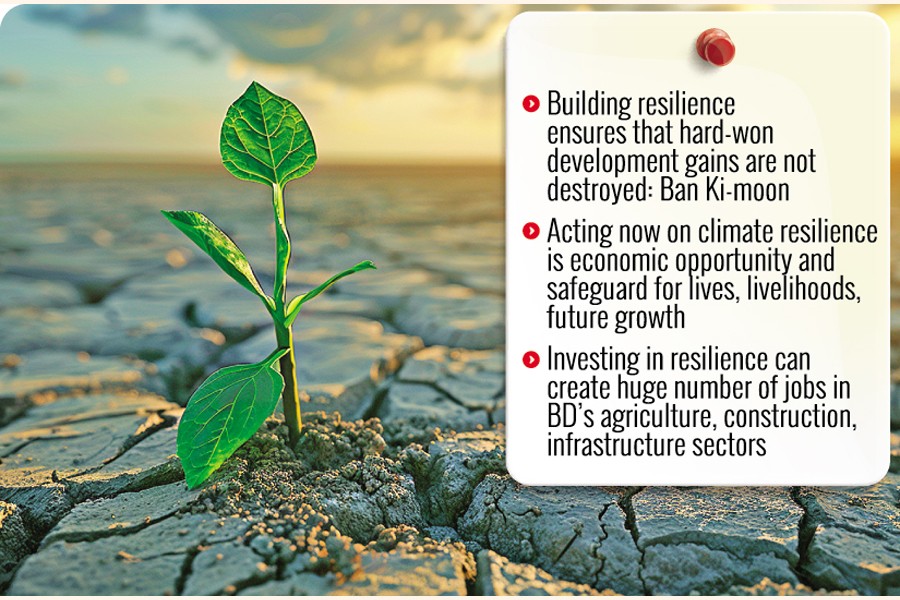
Published :
Updated :

Investing in climate adaptation and resilience is not a cost, it is a powerful economic strategy that can generate trillions in global economic gains, create millions of jobs, and safeguard the vulnerable countries like Bangladesh, according to a landmark report released on Thursday.
The report, 'Returns on Resilience: Investing in Adaptation to Drive Prosperity, Growth & Competitiveness', was unveiled by a consortium of 20 organisations - led by an international group Systemiq - during the World Bank and IMF annual meetings in Washington DC.
It has found that every dollar invested in adaptation can yield returns equivalent to ten dollars. For the countries like Bangladesh, strategic investment in climate resilience and adaptation can protect the economy from future losses.
The analysis has estimated that climate resilience investment could create 28 million new jobs across the developing countries by 2035. At the same time, the global adaptation market is projected to reach US$1.3 trillion annually by 2030.
Former UN Secretary-General Ban Ki-moon said, "Investing in climate resilience means protecting people and their livelihoods in the face of storms, heatwaves, and floods. It is also an urgent economic imperative. Building resilience ensures that hard-won development gains are not destroyed. This is a call to world leaders to make resilience and adaptation the investment agenda of our time."
The report has noted that for Bangladesh and other vulnerable nations, acting now on climate resilience is both an economic opportunity and a safeguard for lives, livelihoods, and future growth.
It has highlighted that Bangladesh has already made notable progress in priority areas of climate resilience, including climate-smart agriculture, drought- and salt-tolerant crops, mangrove restoration, embankment protection, early warning systems for cyclones and floods, resilient health systems, and water and sanitation infrastructure.
Despite these efforts, the country continues to face substantial annual financial losses from rising sea levels, cyclones, river erosion, salinity intrusion, and floods. The developing countries experience ten times more damage from extreme weather than the high-income nations, and take four times longer to recover.
If the current trends continue, the global GDP could decline by 18-23 per cent by 2050, with particularly severe consequences for the countries like Bangladesh that rely heavily on agriculture, fisheries, and coastal settlements.
Investing in climate resilience could create hundreds of thousands of jobs in Bangladesh's agriculture, construction, and infrastructure sectors by 2035. Scaling up adaptation measures could increase economic growth in the developing countries by up to 15 per cent by 2050, reduce foreign debt costs, and prevent up to two million avoidable deaths annually through improved water, health, and sanitation systems.
The report has warned that achieving global climate resilience requires $350 billion in annual investment by 2035. Currently, only $54 billion is being invested, leaving a $296 billion gap. For every $1.0 invested in resilience, $87 is still being spent on infrastructure vulnerable to climate risks.
Dr. Pep Bardouille, Climate Advisor to the Prime Minister of Barbados and Director of the Bridgetown Initiative, said, "Resilience is the bedrock of prosperity, yet it remains the most undervalued investment of our time. "
sajibur@gmail.com


 For all latest news, follow The Financial Express Google News channel.
For all latest news, follow The Financial Express Google News channel.